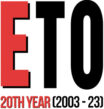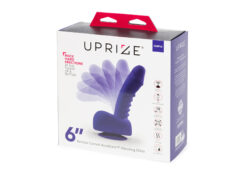As far as one member of the ETO team was concerned one of the highlights of last month’s visit to Germany was winning an iPad on the Pjur stand in a prize draw at eroFame. ‘Well done Jacinta,’ we all said through gritted that-could-have-been-mine teeth.
Competitions, particularly prize draws, are a common sight at trade shows; they allow the sponsoring company to collect a bunch of names and addresses and one lucky winner to get something for nothing.
There was something a little different about the Pjur prize draw though – everyone who participated in it was able to see roughly what chance they had of winning, as it was a condition of entry that the owner of the winning ticket had to be present when it was drawn to be eligible for the prize. If he or she wasn’t gathered at the stand at five o’clock, another ticket was drawn. Judging by how many visitors were at the stand at the allotted time, the competition must have been deemed to have been a success. Of course it helped that the prize was highly desirable too…
Although I did line up like a sheep to give my details to Pjur I am not generally an enthusiast for lottery-like competitions. If there are 100 entrants then one person ends up happy and 99 go away disappointed, and nobody normally wants to create disappointed customers. Lottery-like competitions are quick and easy to run, and are ideal for the busy trade show environment, but any business that wants to build a relationship with its customers, in addition to capturing their data, might benefit by asking entrants to do more than just sit back and hope their number is called.
For instance, retailers who specialise in lingerie could invite their customers to enter a sexy photography competition or those with a thriving books section could run an erotic story or even poetry writing contest. There are several advantages to competitions like these; they are more likely to get coverage in the local media than ‘pick a number’ draws and there is also the option to use the entries in some way after the competition. The best pictures could be blown up in size and displayed around the shop for instance, or the best stories could be compiled into a limited run paperback by a local printer and given away in future in-store incentives or even sold.
While it is always good to have a grand prize of some sort, the important thing to consider when running a skill-based competition is that every entrant should receive something, even if you just use their newly acquired data to mail them a voucher for a 25% discount off their next purchase. It’s far better to encourage unsuccessful entrants back into the store to spend more in future than to just tell them ‘Sorry, you didn’t win’. And when it comes to sourcing the grand prize, it’s a good idea to ask the suppliers you have good relationships with if they are prepared to help – you might be surprised at the response you receive.



![20 years of ETO: Harmony, Charing Cross Road, London [reprinted from issue 1, July 2003]](https://www.erotictradeonly.com/wp-content/uploads/2023/08/NEWS_20YEARS_HARMONY_ISSUE1-238x178.jpg)











